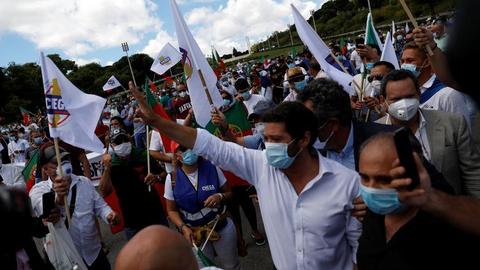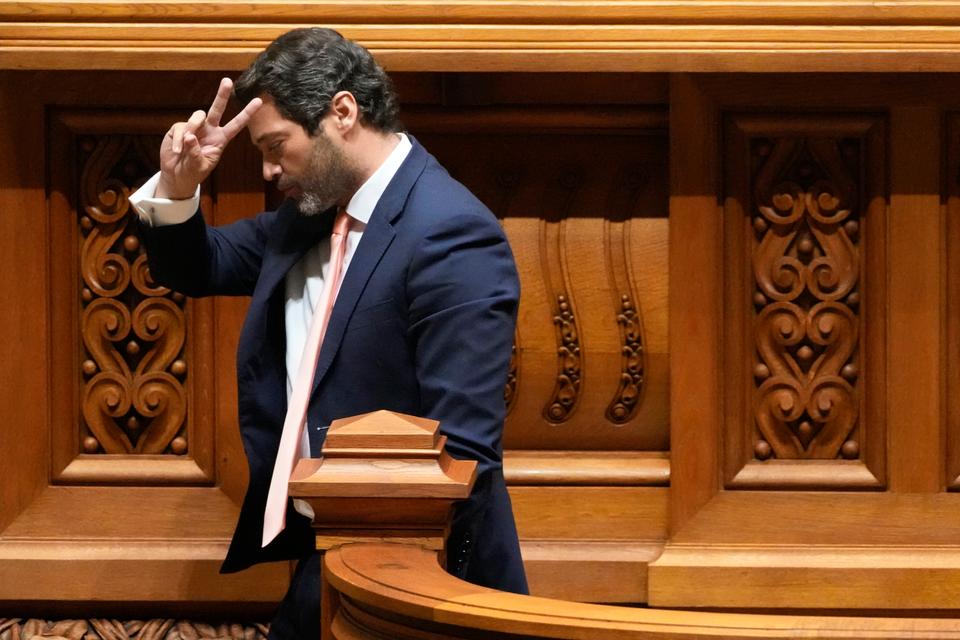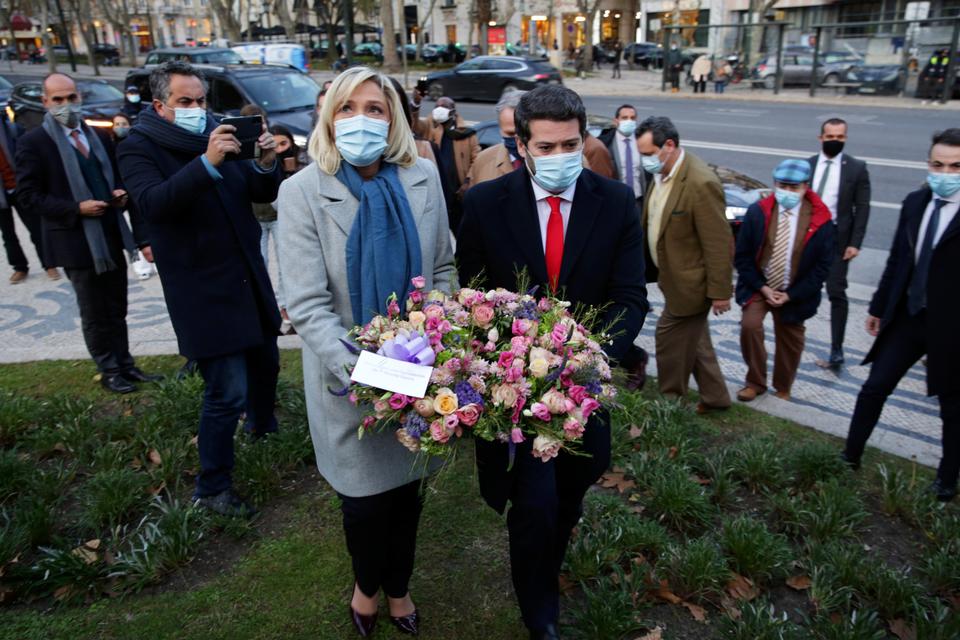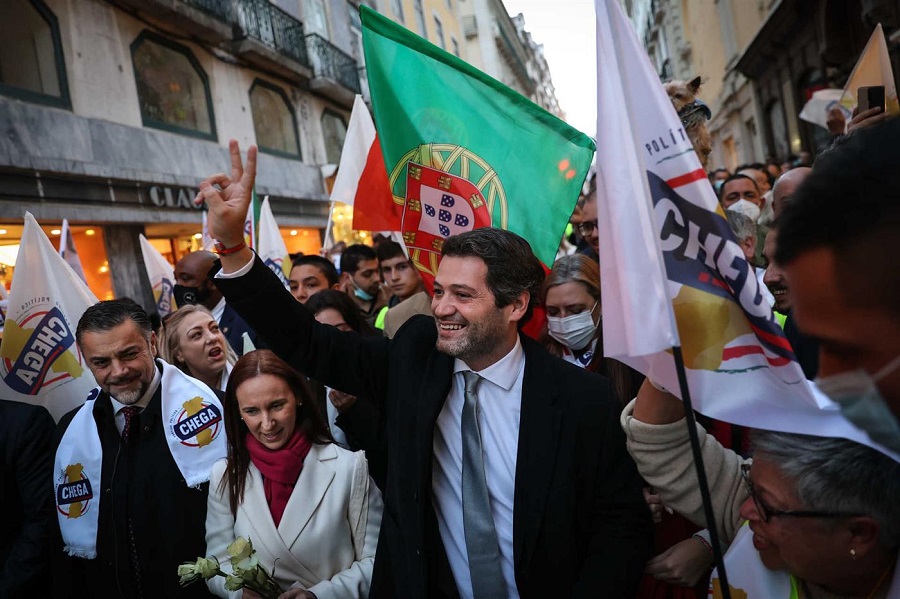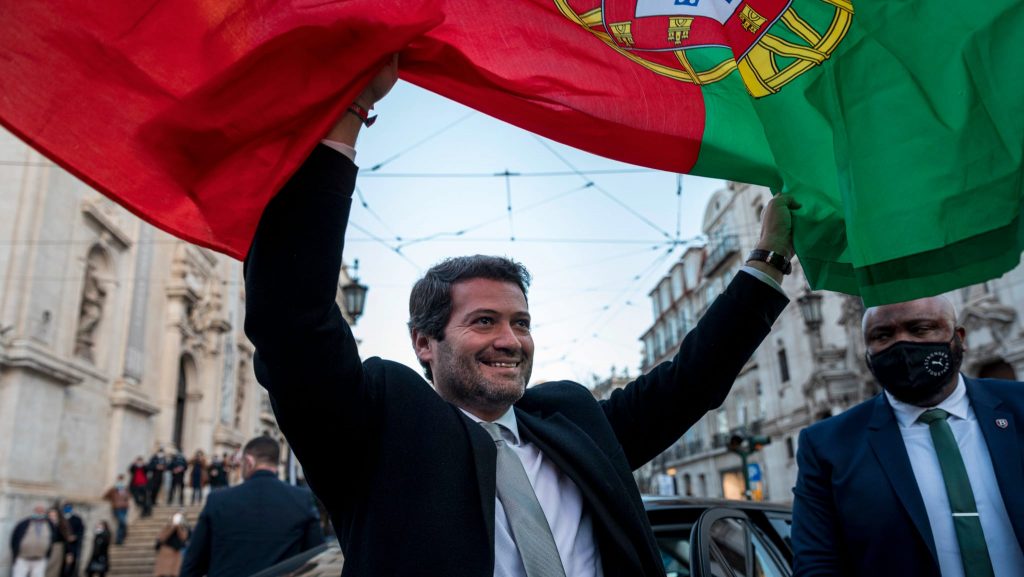This is how a Commie observer chronicles the breaking down of anti-Right
cordon sanitaire in Portugal:

www.european-left.org
The recent memory of the crimes of the Estado Novo dictatorship of António Oliveira Salazar [1899-1970, president of the Council of Ministers from 1932 to 1968] and Marcello Caetano [1906-1980, president of the Council of Ministers from 1968 to April 1974, then military exile in Brazil] and the democratic gains of the Revolution of April 25, 1974 contributed decisively to keeping the Portuguese extreme right in quarantine for many years. Subsequently, the Portuguese party spectrum proved to be quite resilient, mainly in the right-wing camp. Until 2019, the two main parties of the Portuguese right, the Social Democratic Party (PSD) and the Social Democratic Centre – Popular Party (CDS-PP), had never seen a political formation on their right that has managed to impose itself politically.
These two fundamental characteristics: the memory of repression and poverty under the dictatorship and the stability of the party structure have given Portuguese democracy 45 years without representatives of extreme right-wing parties being elected to national and regional parliaments and municipal councils.
...
In the 1980s and 1900s, the neo-Nazi movement gained a certain presence in the regions of Greater Porto and Lisbon. They organized demonstrations, concerts and created a new party: the National Action Mouvement (MAN). Like all its predecessors, its life was short. The activity of these groups was practically limited to violent actions. They had a close link with organized crime. The Portuguese skinheads were convicted of the murder of a young black man, Alcindo Monteiro [in 1995 he was from Cape Verde] and the leftist activist and member of the Socialist Revolutionary Party (PSR), “Zé da Messa” [José Carvalho was killed in October 1989 outside the door of the PSR headquarters in Lisbon]. As a result of this strategy, these skinheads were brought to justice and their main leaders were arrested.
In 1999, a group of far-right activists infiltrated an eroding centrist party, the Democratic Renewal Party (PRD). This group repaid its debts and took control of its leadership and changed its name to National Rewal Party (PNR). The Portuguese Constitutional Court accepted this change in April 2000. The Portuguese extreme right tried to regroup in PNR, but contrary to what happens in many European countries, it did not succeed in coming out of the margins.
The PNR has accumulated successive failures. The best was obtained in the 2015 legislative elections with 0.18% of the cast votes. It has not managed to attract qualified executives, nor has it managed to arouse interest among “economic circles”.
...
In the 2017 municipal elections, the PSD presented André Ventura as candidate for mayor of the municipality of Loures, Portugal’s sixth-largest, located in the outskirts north of Lisbon. André Ventura was known for his inflammatory interventions in defense of SL Benfica (Portugal’s largest football club) in sports commentary panels on television on CMTV and for his inflammatory interventions regarding “criminal acts” in the Portuguese tabloid press. As a member of the PSD’s national leadership, he also chose as a campaign flag the denunciation of the gypsy community, the defense of the death penalty, life imprisonment and the strengthening of repression and police surveillance. The national “populist” discourse created unease among its right-wing partner, CDS, which broke with the coalition.
Despite the strong opposition and resistance that his xenophobic and authoritarian discourse aroused in Portuguese society and also among sectors and leaders of the PSD, the then leader, Pedro Passos Coelho, renewed his support for André Ventura. He supported him in the electoral campaign. This gesture can be read today as the fall of the first cordon sanitaire between the right and the Portuguese extreme right.
André Ventura was elected municipal councillor, his candidacy obtained the 3rd place, behind the Portuguese Communist Party (PCP) (which has led the municipality since 2013) and the Socialist Party (PS). In 2018, after the departure of Pedro Passos Coelho from the presidency of the PSD, André Ventura left the PSD and the municipal council and announced the creation of a new party, the Chega.
The far-right formation, after several initial controversies (they tried to legalize the party using false signatures), was accepted by the Constitutional Court in April 2019.
In May 2019, Chega ran in the European elections under the aegis of the Basta (Enough!) coalition, joined by the Popular Monarchist Party (PPM), the Pro-Life Catholic Traditionalists party (PPV) and a liberal microgroup, “Democracia XXI”. The electoral front of the radical right led by André Ventura is not in the European Parliament. It finished in 9th place, with about 50,000 votes (1.49% of the vote). In the legislative elections of October 2019 Chega ran alone, but included the PPV in its lists. He won 67,826 votes (1.29%) and its leader was elected MP for the Lisbon constituency. A few months later, he declared his intention to run in the January 2021 presidential elections.
The Andalusian moment of the Portuguese right wing
Since Chega’s foundation, a debate has been raging within the traditional Portuguese right on its relationship with the extreme right. Until regional elections in the Azores in October 2020, leaders of the Portuguese parliamentary right rejected any agreement with André Ventura’s party. They accused it of presenting proposals incompatible with their “democratic” and “humanist” programs and principles.
“The proof of the pudding is the eating”. In the regional elections in the Azores in October 2020, the Socialist Party lost its absolute majority. After a long period of 24 years of opposition, the right may return to power. All that was needed was for José Manuel Bolieiro (leader of the PSD/Azores) to reach a parliamentary agreement with Chega, who won two deputies and 5% of the vote.
The extreme right imposed three conditions on the PSD. The first was a commitment to reduce by 50% the number of beneficiaries of the RSI (Income for Social Insertion, a social support for the poorest of the poor). On average, each beneficiary in the Azores receives 86.11 euros per month. Data published by the National Institute of Statistics (INE) shows that nearly 10% of beneficiaries in the Azores are working, 61.3% are women, mostly single, between the ages of 35 and 44. The Azores are in fact the poorest region in Portugal. In addition, Chega has demanded the creation of an “anti-corruption cabinet” – a “populist” measure of no consequence – and the reduction of the number of deputies in the Legislative Assembly of the Autonomous Region of the Azores, a measure which, because it depends on the approval of the Parliament of the Republic and the region itself, will hardly see the light of day.
The Portuguese right wing has had its Andalusian moment in the middle of the Atlantic [reference to Vox’s 2018 results in Andalusia with 11 per cent, allowing for the formation of a right-wing government]. The precedent of the Azores agreement shows that the Portuguese liberal and conservative right will make agreements with the extreme right as long as the key to power remains in their hands. It is of little interest to it, when it comes to taking power, that it thus deepens the naturalization of racist, xenophobic and authoritarian discourse, heir to the worst episodes in Portugal’s contemporary history.
What is Chega made of?
If, during the first months of its existence, Chega tried to avoid the label of extreme right-wing party, it seems that this is no longer a problem for the party leadership. The formation led by André Ventura recently decided to join the European party Identity and Democracy (ID), which brings together most of the European extreme right. He publicly exchanges compliments with the Bolsonaro family, travels to Italy to campaign alongside Matteo Salvini, visits Marine Le Pen in Paris and receives her, in the middle of the presidential campaign, in Lisbon.
The rhetoric and tactics he uses to consolidate his social base also seem to be drawn from the writings of the international extreme right, particularly Bolsonarism: neoliberal economic program, security discourse, deeply racist and xenophobic, nostalgic appeals to Portuguese colonialism and the dictatorship of the Estado Novo, authoritarian populism, mixed with messianic Christian references. André Ventura went so far as to declare publicly that God had entrusted him with the “difficult but honorable task of transforming Portugal”.
The similarities do not end there. According to Portuguese experts, Chega’s digital militia consists of at least 20,000 fake accounts on social networks. These data explain, to a large extent, the success of the party on Facebook and Youtube. This device is used not only to reinforce the party’s propaganda, but above all to spread misinformation and attack journalists, left-wing leaders and activists of social movements. Chega is a veritable factory of lies that leaves Portuguese fact checkers without fingers to count them.
The economic program is a veritable liberal vulgate. Chega intends to completely dismantle the Portuguese social state. It wants to privatize the National Health Service, public schools, social security and public transport and hand over all these public goods to private groups.It advocates for putting an end to progressive taxation and introducing flat taxes which, if applied, would increase the tax burden for those who earn less and then reduce it for those who earn much more. And it proposes to completely liberalize housing evictions and the Labor Law. In its electoral manifesto, the party even advocates lower wages. While the aggressive shock doctrine defended by André Ventura has created him problems in interviews and debates with opponents – Portugal is one of the most unequal countries in the EU, the at-risk-of-poverty rate before social transfers reaches 43% of the population – it has, on the other hand, served as bait to attract funding and support from various businessmen, real estate investors and bankers (many of whom are linked to various financial scandals).
Many of the “Owners of Portugal” publicly assume that they are mobilizing their resources to support André Ventura. These include businessman João Maria Bravo – owner of Sodarca [arms] and Helibravo [air transport]; Miguel Félix da Costa – whose family was for 75 years the representative of Castrol Lubricants, now an influential real estate and tourism investment manager; Carlos Barbot – owner of Tintas Barbot [inks, colors]; or Paulo Mirpuri – CEO of the airline Hi Fly and Mirpuri Investments.
The Portuguese far right also has strong allies in the financial world. Among them are several senior executives of Grupo Espírito Santo (GES), which went bankrupt in 2014, such as Francisco Sá Nogueira, Salvador Posser de Andrade or Pedro Pessanha. The last two are party members. Posser de Andrade, who is still the director of GES’s former property manager, Coporgest, is a national leader and ran in the Lisbon legislative elections. While Pedro Pessanha, a former advisor to the financial group in Angola, is president of Chega’s regional group of Lisbon. Francisco Cruz Martins, former straw man for the business of the Angolan elite in Portugal, and one of the Portuguese names mentioned in the international scandal of the Panama Papers, but also in other national corruption cases, such as the Vale do Lobo case or the bankruptcy of the Banif bank in Madeira. He is a strong supporter of André Ventura. The same can be said of the pharmaceutical businessman, César do Paço, owner of Summit Nutritionals International, which financed CDS until 2019. This ex-consul of Portugal in Florida, in addition to financing Chega, placed in the party his man of confidence – José Lourenço – who, until January 2021, held the position of president of Chega’s Porto chapter.
Like other European “populist” parties of the radical right, Chega’s militant base and leadership structure is an amalgam of groups. The ideologue and first vice-president of the party, Diogo Pacheco de Amorim, has a long experience in the Portuguese far right. He was part of fascist student movements that were to the right of the Estado Novo dictatorship. He was a member of the terrorist groups MDLP, where he was part of the “Political Bureau”, and the MIRN. He was Portugal’s representative in the French neo-fascist magazine Nouvelle École and translator of Alain de Benoist’s texts into Portuguese. He was a member of the CDS-PP. He is also a member of the traditional Catholic movement Comunhão e Libertação. Second Vice President Nuno Afonso, currently Chief of Staff to André Ventura in the Assembly of the Republic, has spent his entire career in the PSD, as has its President. The party leadership also includes a president of the police union, José Dias, a member of Opus Dei, Pedro Frazão, and the leader of Chega’s evangelical neo-pentecostal group, Lucinda Ribeiro, who is also active in the denialist groups of Covid-19.
The party’s National Convention Bureau seems to have been the place chosen by the ultra-nationalist wing to feel represented. The president of this body, Luís Filipe Graça, was a member of several neo-Nazi groups, such as the New Social Order (NOS) or the National Opposition Mouvement (MON), but was also a leader of the National Renewal Party (PNR). Nelson Dias da Silva, a member of this organization and a member of the Chega study group, combines these functions with that of spokesperson for the neo-fascist organization Portuguese First (P1), which includes several well-known faces of the Portuguese neo-Nazi movement, such as João Martins, the assassin of the young black man Alcindo Monteiro.
The party is a growing force in the security forces. The Zero Mouvement (an import of the American Blue Lives Matter movement) is strongly linked to Chega. In November 2019, it organized a demonstration in front of the Portuguese parliament, in collaboration with police union structures. André Ventura was enthusiastically welcomed by hundreds of police officers and was the only political leader invited to speak in front of the demonstrators.
